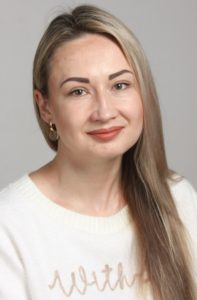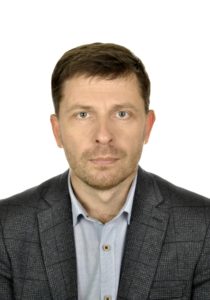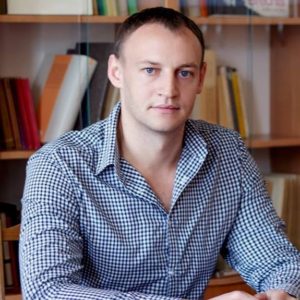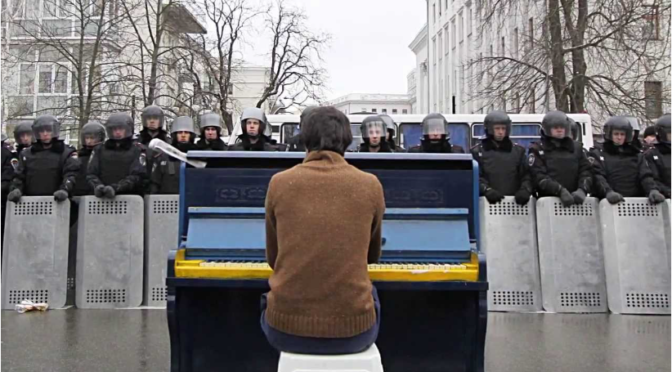A Subaltern That Sings:
From Sound Resistance to Musical Diplomacy in Wartime Ukraine
CEFRES Research Area 1: Displacements, “dépaysements” & discrepancies
Contact: valeriya.korablyova[@]fsv.cuni.cz
 Dr Valeriya Korablyova is a sociologist and political theorist working on post-Soviet transformations in Ukraine and the region, with the research focus on performative politics and entangled imperial/colonial legacies. She is an Assistant Professor at the Department of Russian and East European Studies and the Leader of the Research Centre “Ukraine in a Changing Europe” at the Institute of International Studies, Faculty of Social Sciences, Charles University. Dr Korablyova received her habilitation (D. of Sc. degree) in 2015 from Taras Shevchenko National University of Kyiv, with the book Social Meanings of Ideology (Kyiv University, 2014) that covers transformations of the European modernity, where the ethos of solidarity underpinning the Maidan uprising stands as a specific case in point. She has held fellowships and visiting professorships at Stanford University, the Institute for Human Sciences (IWM) in Vienna, the University of Basel, Justus Liebig University Giessen, and other institutions. Most recently, she has presented on broader implications of the Russian war of aggression for European political imaginary and structures of knowledge production. Her latest publications on the matter include: “Fighting Russia’s ‘Dark Power’: The ‘Bright Power’ of Enacted Values” in Putin’s Europe. Russian Influence in European Democracy (European Liberal Forum, 2023); ‘Why Is Ukraine Important? Challenging the colonial and Cold War legacies in European social sciences’ in Soziologie (vol. 52, no. 3, 2023); ‘Russia vs. Ukraine: A Subaltern Empire Against The “Populism of Hope”’ in Acta Universitatis Carolinae – Studia Territorialia (# 2 2022); and editing the special Topos issue “Transformations of Society and Academia in the Wake of the Russian War in Ukraine: Urgent Notes” (#2 2022).
Dr Valeriya Korablyova is a sociologist and political theorist working on post-Soviet transformations in Ukraine and the region, with the research focus on performative politics and entangled imperial/colonial legacies. She is an Assistant Professor at the Department of Russian and East European Studies and the Leader of the Research Centre “Ukraine in a Changing Europe” at the Institute of International Studies, Faculty of Social Sciences, Charles University. Dr Korablyova received her habilitation (D. of Sc. degree) in 2015 from Taras Shevchenko National University of Kyiv, with the book Social Meanings of Ideology (Kyiv University, 2014) that covers transformations of the European modernity, where the ethos of solidarity underpinning the Maidan uprising stands as a specific case in point. She has held fellowships and visiting professorships at Stanford University, the Institute for Human Sciences (IWM) in Vienna, the University of Basel, Justus Liebig University Giessen, and other institutions. Most recently, she has presented on broader implications of the Russian war of aggression for European political imaginary and structures of knowledge production. Her latest publications on the matter include: “Fighting Russia’s ‘Dark Power’: The ‘Bright Power’ of Enacted Values” in Putin’s Europe. Russian Influence in European Democracy (European Liberal Forum, 2023); ‘Why Is Ukraine Important? Challenging the colonial and Cold War legacies in European social sciences’ in Soziologie (vol. 52, no. 3, 2023); ‘Russia vs. Ukraine: A Subaltern Empire Against The “Populism of Hope”’ in Acta Universitatis Carolinae – Studia Territorialia (# 2 2022); and editing the special Topos issue “Transformations of Society and Academia in the Wake of the Russian War in Ukraine: Urgent Notes” (#2 2022).
Continue reading Valeriya Korablyova – Research & CV →
 Scientist, researcher, professor of the Department of International Economic Relations, Faculty of International Relations and Law, Khmelnytskyi National University (Ukraine). She graduated in Business Economics (MA, 2009) and Law (MA, 2013). In 2013, she received the degree of PhD in Economics, in 2020 – the degree of Doctor of Economic Sciences. From 2009 to the present, she held the positions of Senior Lecturer, then Associate Professor and Professor at Khmelnytskyi National University. Continue reading Ilona Dumanska – Research & CV
Scientist, researcher, professor of the Department of International Economic Relations, Faculty of International Relations and Law, Khmelnytskyi National University (Ukraine). She graduated in Business Economics (MA, 2009) and Law (MA, 2013). In 2013, she received the degree of PhD in Economics, in 2020 – the degree of Doctor of Economic Sciences. From 2009 to the present, she held the positions of Senior Lecturer, then Associate Professor and Professor at Khmelnytskyi National University. Continue reading Ilona Dumanska – Research & CV 




